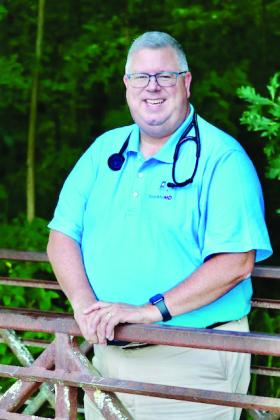HERE IN NORTHWEST OHIO, when spring fever comes, travel plans follow— Easter, school breaks, graduations, weddings, and summer fun. Being far from home can make even minor medical issues significant. It doesn’t have to be that way. In fact, a little preparation goes a long way to staying safe and healthy during travel.
We’re not in Kansas anymore Navigating basic health needs is easy when you are in your back yard. You have numbers at your fingertips and know where and how to get help. Being in someone else’s back yard is another matter.
There are a few things that you should routinely carry with you when traveling. First, ensure your emergency contact numbers are easy to find. There are several ways to store that information on your iPhone or Android. You can also go “old school” and simply write out a card with two or three emergency numbers and place it in your wallet, purse, glovebox, carry-on, luggage, or all of the above.
Second, ensure you have all the medical information you need for travel, including insurance cards, unique insurance documents, and proof of vaccination if required. You can easily carry pictures of these documents on your cell phone.
Finally, prescription medications should be carried in their original bottles, complete with the issuing label from the pharmacy. To be safe, take a picture of the pill and the prescription label next to each other. This makes identification easy in an emergency.
Going the distance
If you plan to travel for more than just a couple of days, there are some additional precautions you might want to take, including:
• Medical records: Make sure you have copies of your medical records, including current prescriptions and information about chronic conditions or allergies.
• Prescription medications: Getting a prescription filled away from home is difficult, and if you are out of the country, it may be impossible. Make sure you have plenty of your prescription on hand for the entire trip, plus a few days’ backup.
• First aid kit: Pack a small kit with essentials like bandages, antiseptic wipes, pain relievers, and other medications for minor ailments.
• Travel insurance: Travel insurance may be just right for an extended trip, especially if traveling abroad. This can provide financial protection in case of unexpected medical emergencies.
• Healthcare providers: If you intend to be gone for an extended time, ask your provider what they do and don’t cover out-of-area. Not all providers are national, and most will have restrictions if traveling abroad.
• Special considerations: Make plans for specific medical needs, such as dietary restrictions or mobility issues. And don’t be afraid to ask for help. The hospitality industry has an excellent track record of helping with these needs from front door to destination.
If you have had any recent medical issues, surgeries, procedures, or medication changes, make sure to consult with your doctor prior to your trip.
Travel is fun. Travel is exciting. Travel is awesome! Enjoy, and safe travels.
Dr. Steven Bills is the owner of TeleMeMD (www.myteleheathmd), an on-demand urgent-care service. Dr. Bills was born, raised, and educated in Toledo, attending St. John’s Jesuit High School and the University of Toledo and graduating in 1993 from the Medical College of Ohio. Dr. Bills completed Emergency Medicine Residency training at the joint St. Vincent/Mercy Medical Center and Toledo Hospital program. Since 1996, Dr. Bills has worked in the Northwest Ohio area in nearby Emergency Departments and as a flight physician on local area medical transport helicopters. ✲


